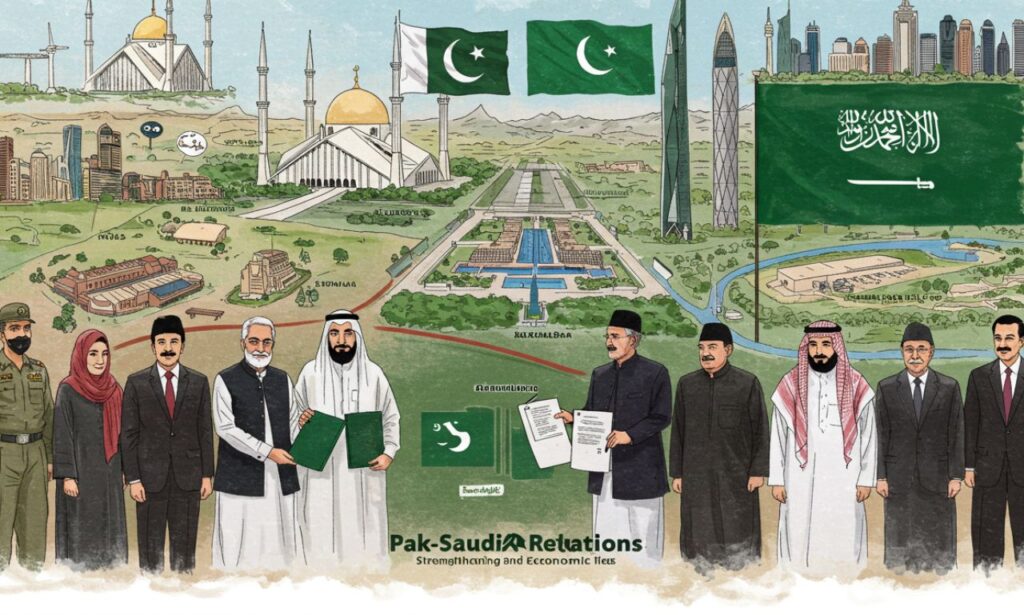The relationship between Pakistan and Saudi Arabia is one of the most significant bilateral partnerships in the Muslim world. More than just a diplomatic connection, Pak-Saudi relations represent shared religious values, economic cooperation, cultural links, and strategic interests. Both countries have supported each other through decades of political challenges, economic reforms, and global transitions.
This article provides a comprehensive look at the history, economic ties, defense collaboration, and future prospects of Pakistan-Saudi Arabia relations — highlighting why this partnership remains a cornerstone of stability in the region.
Historical Roots of Pak-Saudi Relations
Shared Religious and Cultural Bond
Since the creation of Pakistan in 1947, Saudi Arabia has been among its closest allies. The bond is not just political — it is deeply rooted in religion and shared values. Saudi Arabia, being home to the two holiest cities of Islam — Makkah and Madinah — holds immense spiritual significance for Pakistan, a country with one of the largest Muslim populations in the world.
The early years saw Pakistan seeking financial and moral support from Saudi Arabia, while the Kingdom viewed Pakistan as an important partner in the Muslim world. This set the foundation for a relationship based on mutual respect and solidarity.
Economic Cooperation Between Pakistan and Saudi Arabia
Trade Relations and Investments
Economically, Saudi Arabia is one of Pakistan’s largest trading partners and a key source of financial aid. Crude oil and petroleum products form the bulk of imports from the Kingdom, helping meet Pakistan’s energy needs.
In recent years, there has been a major push to expand trade beyond oil. Saudi investments in energy infrastructure, petrochemicals, and technology are helping Pakistan diversify its economy. The Pakistan-Saudi Arabia Supreme Coordination Council, established in 2019, plays a vital role in aligning economic objectives and encouraging joint ventures.
Saudi Support in Times of Crisis
Pakistan has often turned to Saudi Arabia during financial crises. Whether through oil on deferred payments or direct monetary aid, the Kingdom has stepped in to help stabilize Pakistan’s economy. These gestures have not only strengthened trust but also deepened economic dependence.
Defense and Security Partnership
Military Cooperation
Defense cooperation is one of the pillars of Pak-Saudi relations. Pakistani military personnel have been stationed in Saudi Arabia for decades, providing training and strategic advice. Joint military exercises and intelligence-sharing initiatives have further enhanced this partnership.
Regional Security and Counterterrorism
Both countries have worked together to promote peace in the region. Pakistan has supported Saudi-led efforts to ensure stability in the Gulf region, while Saudi Arabia has backed Pakistan’s stance on issues like Kashmir. Counterterrorism collaboration is another major area where both nations share common goals.
Pak-Saudi Relations in Regional Diplomacy
Role in the Muslim World
As two influential members of the Organization of Islamic Cooperation (OIC), Pakistan and Saudi Arabia have often coordinated on key issues affecting the Muslim world. From Palestine to Afghanistan, both countries have jointly advocated for peace, justice, and humanitarian relief.
Balancing Global Ties
While maintaining strong relations with Saudi Arabia, Pakistan also seeks balanced ties with other Gulf states, Iran, and global powers like China and the United States. This balancing act sometimes creates diplomatic challenges, but Riyadh and Islamabad have consistently found ways to maintain trust and cooperation.
Cultural and Religious Connections
Hajj and Umrah Facilitation
Millions of Pakistani pilgrims visit Saudi Arabia every year to perform Hajj and Umrah. The Saudi government has invested heavily in improving facilities and easing visa processes for Pakistani visitors, making religious travel more convenient.
Cultural Exchange and People-to-People Ties
Pakistani expatriates form one of the largest communities in Saudi Arabia. Their remittances contribute significantly to Pakistan’s economy, while their presence strengthens cultural and linguistic exchange between the two nations.
Challenges in Pak-Saudi Relations
While the relationship remains strong, it has faced challenges over the years.
-
Geopolitical Pressures: Pakistan’s efforts to stay neutral in Middle East conflicts sometimes create tension.
-
Economic Dependence: Reliance on Saudi financial assistance can limit Pakistan’s economic independence.
-
Shifting Regional Dynamics: Saudi Arabia’s evolving ties with India and growing interest in diversification under Vision 2030 require Pakistan to adapt diplomatically.
Despite these challenges, both nations have demonstrated resilience and a willingness to resolve differences through dialogue.
Vision 2030 and Future Opportunities
Saudi Arabia’s Vision 2030 — a plan to diversify its economy away from oil — offers Pakistan a chance to deepen its engagement. Opportunities include:
-
Energy Projects: Collaboration on renewable energy and refining capacity.
-
Construction and Infrastructure: Pakistani companies can contribute to mega-projects like NEOM.
-
Skilled Labor Export: Pakistan can supply skilled professionals to meet Saudi Arabia’s growing workforce needs.
-
Technology and Innovation: Joint ventures in IT, fintech, and startups can benefit both economies.
These areas of cooperation can transform Pak-Saudi relations from aid-based ties to mutually beneficial economic partnerships.
Public Perception of Pak-Saudi Relations
Among the Pakistani public, Saudi Arabia is generally viewed positively due to religious reverence and historical assistance. Similarly, many Saudis respect Pakistan’s military contributions and cultural affinity. Social media has become an important space where citizens from both countries share perspectives, strengthening people-to-people ties.
The Road Ahead for Pak-Saudi Relations
The future of Pak-Saudi relations will depend on adapting to global changes while maintaining shared values. By focusing on long-term trade, sustainable development, and cultural collaboration, both nations can create a partnership that benefits not only their citizens but also contributes to peace and prosperity in the Muslim world.
Conclusion
Pak-Saudi relations have stood the test of time, evolving from a relationship based on aid and religious solidarity to one driven by economic cooperation and strategic goals. As both nations face the challenges of a rapidly changing global landscape, their partnership will remain a cornerstone for regional stability and prosperity.
For Pakistan, Saudi Arabia represents more than a friend — it is a strategic ally, a spiritual destination, and a key economic partner. For Saudi Arabia, Pakistan remains a reliable military collaborator and an important player in the South Asian region.
Looking ahead, the next phase of this relationship will likely focus on innovation, trade, and building a stronger future that reflects the aspirations of their growing populations.







